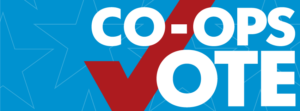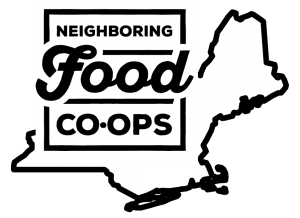 Your Neighboring Food Co-ops
Your Neighboring Food Co-ops
Locally Owned by More Than
150,000 People Like You!
In this Month’s E-News, check out:
- Celebrating Co-op Month
- Co-op IMPACT Conference
- NFCA’s Member Engagement Workshop
- October’s Cave to Co-op Special
- Co-op 2 Co-op Special Collaboration
- Farmers Union Co-op Education Series
- Co-op Calendar
October is National Co-op Month, and your Neighboring Food Co-ops join other co-operatives and credit unions across the United States to celebrate!
Celebrated nationally since 1964, Co-op Month is an opportunity for food co-ops and their members to spread the word about the contributions they make to their communities every day, 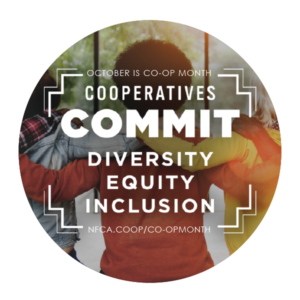 and challenge ourselves to do more as we work to build a more healthy, just and sustainable food system and economy.
and challenge ourselves to do more as we work to build a more healthy, just and sustainable food system and economy.
This year’s theme, “Co-ops Commit: Diversity, Equity & Inclusion,” was chosen by the National Cooperative Business Association (NCBA CLUSA) to challenge our movement to take on the work of building more diverse, equitable, and inclusive workplaces and boards, and work together to empower their communities.
Here are some of the special activities NFCA co-ops have been doing to celebrate Co-op Month: from in-store events, special sales and membership drives, to community activities…and more:
- The NFCA worked with the Valley Co-operative Business Association and Valley Alliance of Worker Co-ops to request a Co-op Month Proclamation from Massachusetts Governor Charlie Baker.
- The NFCA and seven of our Member Co-ops participated in a congratulatory ad for Ben Burkett of the Federation of Southern Cooperatives on his induction into the Co-op Hall of Fame.
- Over 25 different types of co-ops participated in a group print ad in the Greenfield Recorder and Valley Advocate, including 7 NFCA co-ops.
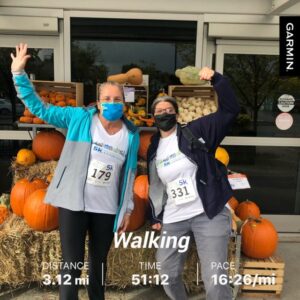
- Co-op 5K Participation! We kicked off Co-op Month with Team Neighboring Co-operators and NFCA Co-op member teams from Blue Hill Co-op, Hunger Mountain Co-op, Mad River Co-op. Our sponsorship and monies raised support Cooperative Development Foundation’s (CDF) cooperative development nationwide. Joined with 500+ co-operators from 29 states and 4 countries, we collectively raised over $65,000 for CDF!
- Middlebury Natural Foods Co-op (VT) is engaging staff to better understand how to be a part of dismantling the systems of oppression. One way is through a book group, choosing books that help engage in honest conversations about racism and the way it impacts all aspects of American life.
- Co-ops went on the airwaves to share the Co-op Difference including River Valley Co-op (MA) and Franklin Community Co-op on the WHMP Bill Newman radio show focusing on co-operatives.
- Common Share Co-op (MA) participated in and promoted webinar session “Collective Hope” with Amaha Sellassie, board president of Gem City Co-op learning how empowered their community is addressing systemic racism and food insecurity.
- Franklin Community Co-op (MA) and Littleton Food Co-op (NH) dedicated their “Round Up” at the register donation to the promotion of co-op organizations.
- Fiddleheads Food Co-op (CT) featuring co-op produced products and NFCA collaboration with Jasper Hill/Cabot Clothbound special.
- Monadnock Food Co-op (NH) highlighted in their newsletter and supported Ben Burkett, Federation of Southern Co-operatives and Land Assistance Fund, with his induction into the Co-op Hall of Fame.
- Neighboring Food Co-ops showed off their Co-op Pride into the Co-op Month Photo Competition.
How is your food co-op celebrating Co-op Month as we work to build more diverse, equitable, and inclusive workplaces, boards, and communities?
For more information on Co-op Month, and resources to help your co-op celebrate, visit: https://nfca.coop/Co-opMonth.
With a record 922 registrants, NCBA CLUSA’s Cooperative IMPACT Conference provided an unparalleled platform to reenergize the co-operative movement around building a diverse, equitable and inclusive economy.
The conference theme linked three tracks, more than 40 sessions and 125 speakers across five days 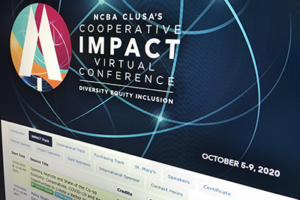 of programming that inspired learning and action. If you missed the conference, you can still REGISTER to watch recorded sessions.
of programming that inspired learning and action. If you missed the conference, you can still REGISTER to watch recorded sessions.
On Monday, NCBA CLUSA Board Chair and NFCA Executive Director Erbin Crowell welcomed attendees. “In this moment, as we face twin pandemics of COVID-19 and the challenge of institutional racism and inequality, co-operatives have never been as relevant. We know that confronting these issues with commitment and integrity is not only profoundly relevant to our principles and values — it is crucial to our success. We have an opportunity to make more people aware of the co-operative model as a proven tool for economic empowerment and equity. And we also have a responsibility to ensure that more people understand and have access to the power of co-operation as we work to rebuild our communities, and rebuild better.”
To lead off the conference, the International Centre for Co-operative Management at Saint Mary’s University offered an executive education session on “Excellence in Member-centric Governance and Management,” focuses on the unique nature of co-operative membership and challenges inherent in leading and managing co-ops while including voice, representation, participation, and engagement of people at the core. Presenters included Karen Miner, Managing Director of the International Centre for Co-operative Management; Dr. Sonja Novkovic, Academic Director of the International Centre for Co-operative Management & Chair of the International Co-operative Alliance Committee on Co-operative Research, Fred Freundlich of the University of Mondragon), and Erbin Crowell, NFCA Executive Director. Get information on future opportunities to participate in this training.
IMPACT attendees got an exclusive first look at a new report from the Urban Institute on policy strategies designed to jumpstart co-operative development and expansion to address contemporary issues—in particular, to enhance the work of co-ops that address economic and racial disparities in the U.S. The Urban Institute’s Brett Theodos urged attendees to “tell a new story,” one that “contextualizes co-ops within the current political environment.”
On Tuesday, participants heard an inspiring keynote from Thaleon Tremain, CEO of Pachamama Coffee Cooperative, the first direct-to-consumer coffee roaster in North America wholly owned and governed by thousands of smallholder farmers in African and Latin America, connecting coffee producers directly to end consumers. “We get to decide which version of the future we want to support,” Tremain said in regard to the choices consumers make when buying products like coffee.
During a live keynote on Wednesday, co-op professor and historian Jessica Gordon-Nembhard dispelled the notion that “co-ops can’t be racist,” noting that the movement’s fundamental grounding in open membership and democratic member control are not enough to offset the cumulative effects of structural and institutional racism—particularly in the U.S.
“It’s not good enough to be diverse; it’s not even good enough to be inclusive. We need to deliberately promote and practice racial equity,” said Gordon-Nembhard, who teaches Community Justice and Social Economic Development in the Department of Africana Studies at John Jay College of Criminal Justice.
She unpacked the ways in which racism can manifest in co-ops—whether in overt or, more likely, invisible and unintentional ways—and the path forward. One critical element is incorporating the Black co-operative history of survival, resistance and prosperity into the broader co-op story, she said.
Gordon-Nembhard’s keynote was followed by an interactive town hall and panel discussion led by National Cooperative Bank‘s John Holdsclaw IV on how co-ops can begin to take concrete steps toward a more diverse, equitable and inclusive economy.
On Thursday, Congresswoman Nydia Velázquez (D-NY) accepted NCBA CLUSA’s 2020 Cooperative IMPACT Champion Award, noting that despite the challenges of COVID-19, the crisis has “showcased the power of the co-operative model” as co-ops demonstrate their resilience and ability to adapt and innovate to meet their communities’ changing needs.
Also on Thursday, this year’s International IMPACT Track kicked off with a keynote from Harvard Business Professor Rebecca Henderson and representation from close to 50 countries.“[Co-operatives] show millions of other firms around the world that there is a different way to run firms—a better way,” Henderson said.
The Co-op Hall of Fame induction ceremony offered an opportunity for the co-operative community to celebrate some of our co-operative heroes, including Ben Burkett, Everett M. Dobrinski, Carmen Huertas-Noble, and Michael Mercer. To learn more about these inspiring co-operators and view the proceedings, emceed by NFCA executive director Erbin Crowell, visit https://www.heroes.coop/2020-inductees.
IMPACT 2020 sessions are available on demand throughout the month of October. If you missed the conference, you can still register at a reduced rate and receive full access to all recorded conference programming.
Get more information and register: https://ncbaclusa.coop/2020-co-op-impact-conference.
(Thanks to NCBA CLUSA for content for this article.)
NFCA’s Member Engagement Workshop
Food Co-op leaders dig into “Rekindling Membership for Co-op Success” at NFCA’s Fall Peer Event.
On September 11, over 70 food co-op board members and staff from Neighboring Food Co-ops 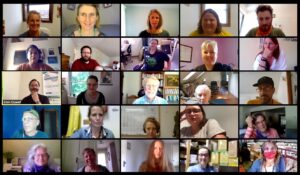 across New England and New York came together for shared learning and innovation at NFCA’s fall peer workshop, “More Than Good Food: Rekindling Membership for Co-op Success“. The Hanover Co-op Food Stores hosted and sponsored the event and shared their Co-op’s member engagement innovations, while staff from Beth Saunders Associates shared new member engagement tools and strategies for NFCA members. Thanks to the Cooperative Development Foundation for supporting this event and our continued learning and growth as an association of food co-ops.
across New England and New York came together for shared learning and innovation at NFCA’s fall peer workshop, “More Than Good Food: Rekindling Membership for Co-op Success“. The Hanover Co-op Food Stores hosted and sponsored the event and shared their Co-op’s member engagement innovations, while staff from Beth Saunders Associates shared new member engagement tools and strategies for NFCA members. Thanks to the Cooperative Development Foundation for supporting this event and our continued learning and growth as an association of food co-ops.
NFCA’s Bonnie Hudspeth (Co-operative Development) kicked off the workshop with discussion of strategies for leveraging our collective strengths through our association of food co-ops, and NFCA Erbin Crowell (executive director) shared about “Doubling Down on our Difference”:
“How can we best respond to competition and leverage our co-op difference for success while serving our members and communities?” Crowell asked participants. “We need to reclaim the meaning of ‘membership’ in a co-op and leverage member engagement impact and success.”
The workshop gave focus to how food co-op leaders can reclaim the power of the co-operative model and restore membership to be more than simply joining, shopping, or voting at your Co-op’s annual meeting, and how to leverage member engagement for impact and success. Emily Rogers, Member Education Manager of Hanover Co-op, shared case study innovations from their Co-op that helped their Co-ops’ staff better understand their member-owners and deepen their member and customer participation in and loyalty to their Co-op.
Beth Saunders and Cindy Johnson (of Beth Saunders Associates) teamed up with Hanover Co-op staff to offer new ways to approach member engagement and participation that integrates co-operative principles with business success.
“When talking member engagement, co-ops are great at offering initial steps to engagement (join the co-op! shop at our store!) and opportunities for high levels of engagement (please join the board!),” shared Beth Saunders. “It was great to talk with this committed group of co-op leaders about building the middle – where the magic happens – where members volunteer, advocate, and join committees. Values based activities such as these are necessary for meaningful member engagement.”
Co-op 2 Co-op Special Collaboration
Cabot Clothbound Collaboration with Food Co-ops for Co-op Month
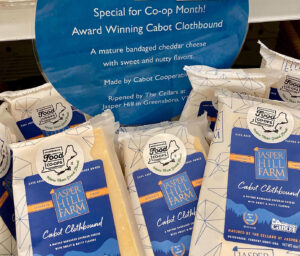
Cabot Clothbound is an award-winning cheese made by Cabot Creamery Co-operative and then ripened by The Cellars at Jasper Hill in Greensboro, VT. Located in the Northeast Kingdom of Vermont Jasper Hill’s mission is to make the highest possible quality products in a way that supports Vermont’s working landscape. Cabot Creamery is a co-operative owned and operated by its members: dairy farmers and their families throughout New England and Upstate New York.
Last spring when COVID-19 pandemic hit causing food service shut downs and altering purchasing patterns throughout the region Jasper Hill began packaging Cabot Clothbound in precut packages making it easier for consumer purchasing and co-op stocking. Cabot Clothbound is a favorite of our region with it’s crumbly texture, nutty aroma and signature tang of a great cheddar. The milk for Cabot Clothbound comes from the Kempton’s Farm in Peacham, VT, a multi-generational dairy farm in operation since 1961.
Your local food co-op works hard to offer products that strengthen local economies, support sustainable agriculture, and grow community ownership. Working together, we recognize that we have a greater impact than when we work alone. This Co-op Month we arranged an exclusive collaboration with Jasper Hill to offer NFCA Co-ops Cabot Clothbound at a special price.
Cabot Clothbound has a savory-sweet balance of flavor makes a perfect match for charcuterie, apple jelly, rich honey or apple pie! Jasper Hill suggests pairing with sparkling apple cider, a hoppy ale, or an oaked Cabernet Sauvignon. The prepackage wedges have longer shelf life so don’t be shy in purchasing some for next month too.
Look for the blue and white packages sporting the NFCA sticker this fall and celebrate Co-op Month with great co-op made cheese!
For more information, visit www.nfca.coop/CaveToCo-op
October’s Cave to Co-op Special
Cowles, Barn First Creamery, Westfield, VT
Cowles is a soft-ripening square of goat cheese with a bloomy ash-tinged rind and a tart bite. 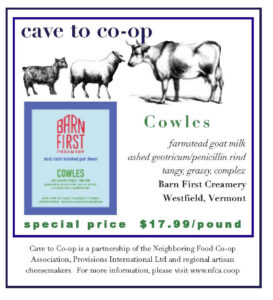 Cheesemaker Rebecca Velazquez and Merlin Backus care for the ~40 goat herd at their Barn First Creamery. Barn First is located in Westfield, Vermont which is part of Vermont’s remote Northeast Kingdom. Rebecca and Merlin produce 100% pasture raised goat-milk cheese with each cheese bearing the maiden name of an ancestress, names lost to the patriarchy.
Cheesemaker Rebecca Velazquez and Merlin Backus care for the ~40 goat herd at their Barn First Creamery. Barn First is located in Westfield, Vermont which is part of Vermont’s remote Northeast Kingdom. Rebecca and Merlin produce 100% pasture raised goat-milk cheese with each cheese bearing the maiden name of an ancestress, names lost to the patriarchy.
Each month our Cave to Co-op partnership between Provisions International and the Neighboring Food Co-op Association (NFCA) offers a delicious regional cheese featured at a great price. Strengthening our local and regional farmers and producers by supporting artisanal cheesemakers is a key element of the Cave to Co-op program. For more information about Cowles see the October Cave to Co-op page.
Cowles has a texture which is dense and chalky, like a goat’s milk brie cheese, and the flavors are light and mild – tangy and mineral with a hint of goaty musk. Each 9 oz square is easily cut into rectangular slices perfect for serving on baguettes or try this combo: Grilled Cowles and Olive Crostini.
Grilled Cowles and Olive Crostini
- 1 piece Barn First Cowles
- 1 baguette bread loaf, sliced
- ¾ cup black olive tapenade spread
- 2 avocados, cut in small cubes
- ½ cup garlic butter, melted
- 1 tbsp, fresh chopped parsley
- 3 tbsp red pepper, diced
Directions
- Heat barbeque and spray with non-stick cooking spray.
- Grill Cowles for 30-45 seconds, turn cheese 90 degrees and continue cooking for 30-45 seconds, creating a diamond shape grill pattern.
- Turn Cowles over and repeat. Remove Cowles from grill and allow to cool completely and refrigerate.
- Preheat oven to 375° F.
- Slice baguette into thick slices, and place on a baking sheet.
- Brush melted garlic butter on each slice and bake for 5 minutes.
- Thinly slice Cowles and place on each piece of bread. Spoon olive tapenade on top.
- Mix avocado and red pepper together in small bowl and spoon on top of Cowles and tapenade. Sprinkle with parsley and bake for 3-4 minutes until the Cowles is soft and bubbling.
Farmers Union: NEW Co-op Education Series
As part of its co-operative legacy, the National Farmers Union launched a new webinar series on the Co-operative Movement.
Co-operative enterprise has been part of the American economy since its beginnings and has 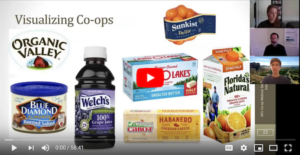 played a particularly important role in our rural communities. Today, 1 in 3 people in the U.S. are co-op members and we are seeing this business model used in new and innovative ways. Co-operatives enable people to work together to meet their needs and goals, providing themselves with everything from farm supplies to groceries, good jobs to financial services, and shelter to electricity.
played a particularly important role in our rural communities. Today, 1 in 3 people in the U.S. are co-op members and we are seeing this business model used in new and innovative ways. Co-operatives enable people to work together to meet their needs and goals, providing themselves with everything from farm supplies to groceries, good jobs to financial services, and shelter to electricity.
But what is a co-op? What makes it unique from other business models? What are some of the ways that co-operatives have been used in the past, and how can they help us build stronger, more resilient and sustainable communities?
Hosted by Erbin Crowell, Chair of the National Cooperative Business Association, CLUSA International and Executive Director of the Neighboring Food Co-op Association, this series will explore these and other questions over the coming year. The purpose of this series is to build on the National Farmers Union’s co-operative legacy, encourage people to be involved in co-ops, and answer questions for people interested in co-operative enterprise.
These webinars will be particularly useful to co-ops looking for easily accessible educational resources that can help acquaint co-op members and staff with co-operative movement. View the recording of the series introduction launched in October during Co-op Month.
Our Local Farmers & Fishermen Need You!
Do you care about where your food comes from and want to support the people who produce it? Join the NEFU as a Friend of the Farmer for just $15. Your membership will help ensure that our region’s producers and consumers are heard by policy makers here at home and in Washington, DC. For more information, please visit www.newenglandfarmersunion.org.
For More Co-op Events, Visit https://nfca.coop/calendar
The Neighboring Food Co-op Association (NFCA) is a co-operative federation of 40 food co-ops and startup initiatives across New England, working together toward a shared vision of a thriving co-operative economy, rooted in a healthy, just, and sustainable food system and a vibrant community of co-operative enterprise.


